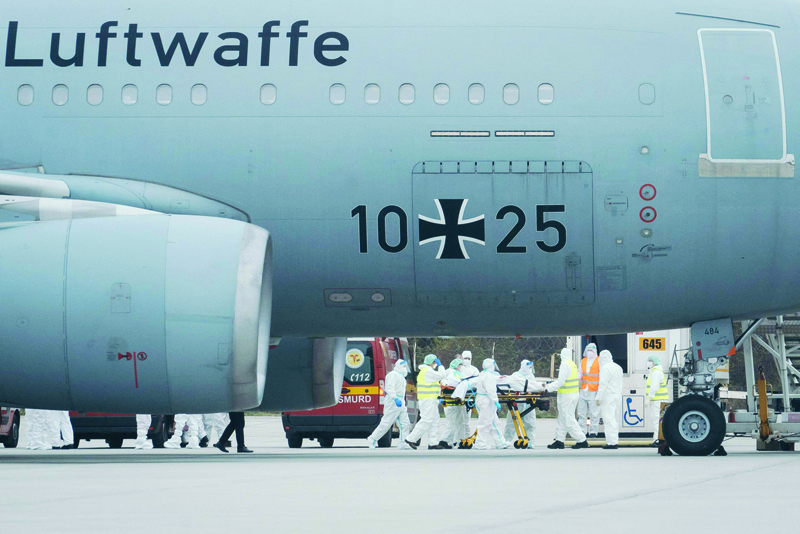 OTOPENI: Medical personnel help transfer a COVID-19 patient onto a German military airplane yesterday in Otopeni, Romania. Six Romanian patients with severe cases of COVID-19 have been transferred to Germany for treatment. - AFP
OTOPENI: Medical personnel help transfer a COVID-19 patient onto a German military airplane yesterday in Otopeni, Romania. Six Romanian patients with severe cases of COVID-19 have been transferred to Germany for treatment. - AFPBERLIN: Germany's COVID-19 incidence rate surged to over 150 for the first time since May yesterday, prompting concerns of a rampant fourth wave as the country wrestles with a change of government. The number of new infections per 100,000 people over the past seven days reached 154.8, according to the Robert Koch Institute (RKI) health agency - up from 110.1 a week ago.
Outgoing Chancellor Angela Merkel on Sunday called for swift measures to tackle the "very worrying" trend, stressing that Germany could not afford to wait until a new government is in place. The country recorded 9,658 new COVID-19 cases in the past 24 hours yesterday and 23 deaths, according to the RKI. Merkel is due to step down as German leader after 16 years in power after an election in September narrowly won by the centre-left Social Democrats (SPD).
The SPD is currently in talks with two other parties and aiming to form a ruling coalition by early December, leaving the country in a kind of political limbo as it confronts the surge in new cases. Social Democrat Olaf Scholz, the likely next chancellor, said Sunday that Germany must do what was necessary "to ensure that we keep the pandemic under control". But he also said that in a country where a large number of people have been vaccinated, it is no longer possible to respond with strict measures such as lockdowns.
Vaccine hesitancy
Germany has also so far ruled out compulsory vaccinations, instead focusing on encouraging as many people as possible to get the jab voluntarily. But its vaccination campaign has ground to a halt with just 66.7 percent of the population fully inoculated. In a Forsa survey carried out for the health ministry and published Thursday, 65 percent of unvaccinated respondents declared there was "no way" they would take a COVID jab and 23 percent were "reluctant". At the same time, health professionals have reported a new influx of infected people into hospital, mostly unvaccinated.
Hospitalisations due to COVID have increased by 40 percent in the past week, according to the German Hospital Society, with intensive care admissions up by 15 percent. Merkel on Sunday admitted being "very saddened" that as many as three million Germans aged over 60 have still not had the jab. She also told the Frankfurter Allgemeine newspaper that increasing hospital admissions "worry me a lot" and "should worry all of us", saying that "a certain recklessness" had taken hold in Germany.
Care home outbreaks
The country has also seen a resurgence of outbreaks in care homes, including a home in Mecklenburg-Western Pomerania state where 66 of the 83 residents were infected and 14 died. Only six percent of the residents were not vaccinated, but around one in three of the staff had not received the jab.
A similar case was reported in Norderstedt, near Hamburg, where 68 out of 76 residents in a care home came down with the virus. Outgoing Health Minister Jens Spahn has called for a meeting between the government and the leaders of Germany's 16 states to devise a common policy to encourage those already vaccinated to get booster jabs. Merkel on Sunday also stressed her support for boosters, saying Germany "must do something" to ensure they are widely available.
A spokeswoman for the chancellor yesterday said the government was "ready for talks" with the regional leaders. Under Germany's federal system, each state can ultimately decide its own COVID-19 response, a system that has previously slowed down pandemic planning and led to a patchwork of different approaches. As has often been the case during the pandemic, the highest incidence rates are currently seen in the former communist East Germany, such as in Thuringia (314.9) and Saxony (291.6). - AFP










